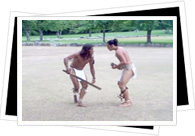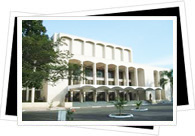
Although there is a hidden wealth of culture in the Dominican Republic, theatre is not one of those wealths.
The Taíno tribes who lived on Hispaniola at the time of the Europeans arrival, had their own entertainment.
They would perform Areíto, a combination of music, dancing and acting which was their way of passing important stories down through generations.
The Taíno would also peform Cohaba, but this was more of a ceremonial dance.
It is believed that the Dominican Republic was the first country in the Americas where dramatic art in European style was performed. Diego Columbus, son of the famous explorer of the Atlantic Ocean, Christopher Columbus, was known to have brought some poetry books to the country which would be acted out along with dramatic dialogues, as entertainment for the early European settlers and so started up the Dominican theatre.
The Spanish missionaries used their limited understanding of the Taíno language along with drama to explain the religion of Christianity to the natives and promote it as the new religion for them.
Religious focused theatre proved to be popular throughout society during the colonial times, as well as secular theatre and comedies.
In the 1830's and 40's Juan Pablo Duarte used theatre to his advantage in planting ideas to the public and officials of separating the Dominican Republic to be a new country on Hispaniola, rather than part of Haiti.

The early 20th century saw comedy sketches at the height of popularity in the Domincan Republic theatres, although present day theatre dates back to 1946 as the wife of the country's then dictator pushed for a cultural theatre of fine arts.
Currently, the Dominican Republic's theatre scene is focused towards Santo Domingo. It is home of the National Theatre whose replica, the Cibao Grand Theatre, is located in Santiago in the north of the island.
Unfortunately for the local Dominican Republicans, the few shows that are staged are sporadic. The country has very few accomplished actors and the infrastructure lack hampers many production ideas.